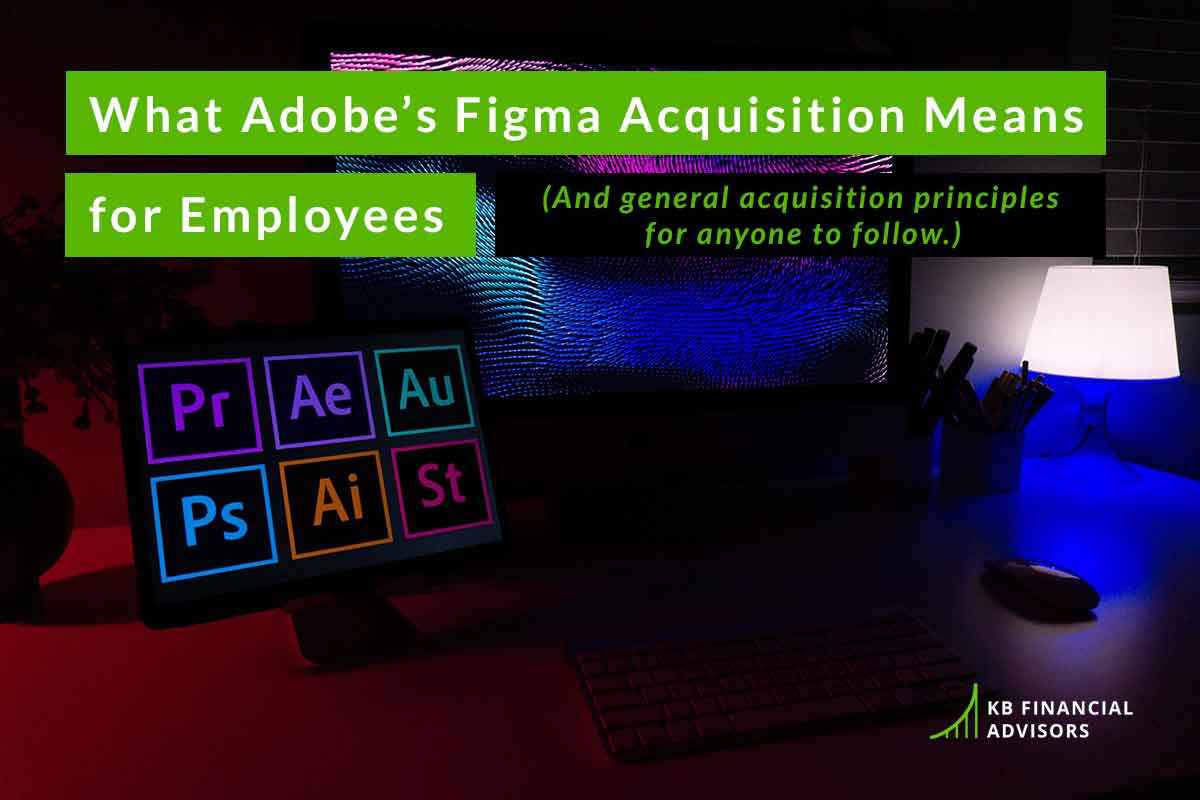(And general acquisition principles for anyone to follow.)
Nothing gets me amped up like an acquisition or an IPO.
Helping our clients through one of these is not unlike the charge one gets from chugging a massive Monster energy drink, and using the sugar and caffeine high to be ultra-productive and feel on top of the world.
Nerdy, I know, but it’s those kind of nerdy attributes you want in a good tax planner, right?
Truthfully, 2022’s been a little dry acquisition-wise, but a little birdie told me about an exciting one coming up:
Adobe is going to acquire Figma. ????
What does Adobe’s Figma acquisition mean for their employees?
In general, acquisitions happen for two reasons:
- The acquiring company wants to increase their market share & gain more customers—the customers of the smaller company.
- The acquiring company knows they need to innovate, and purchasing a smaller company that’s done a great job of innovating lets them take advantage of all that hard work, without having to do it from scratch.
As a worker, acquisitions can be equally exciting and scary times:
Will this change your day-to-day work environment? Do you get to liquidate your shares and have a big pay day? Will your position be made redundant?

Unfortunately, only time will tell how the acquisition will affect your position (let’s hope it’s only in good ways!), but once you catch wind of the acquisition happening, there is one thing that’s in your control, and you can start planning how to execute on it successfully:
????How you’ll use this opportunity to liquidate some (or all) of your stock options.
Different ways acquisitions affect stock options
Not all acquisitions are created equal, including how they affect your stock option opportunities. You may see:
- An all-cash offer for your options
- A stock-for-stock swap out of your options
- A mixture of a cash payout and stock swap for your options
No matter which route the acquiring company takes, there are clearly financial and tax planning pieces you’ll need to take care of.
But that’s just for your options that have vested.
If you have options that are still vesting, you’ll need to find out what will happen there, too.
- Will the new parent company honor those same grant offers?
- Will they give you a better grant offer?
- Will they take a different route altogether and restructure your compensation package?
It may take time to know exactly what will happen, because each company typically works through these details after they decide to perform the acquisition, not before. But keep an eye on your inbox, and if you don’t hear anything, don’t be afraid to ask your HR or payroll department.
(If you’re a Figma employee, keep your eyes peeled for communications from Allen & Company LLC, or Wachtell, Lipton, Rosen & Katz. These are the investment firm and legal advisor who will assist in closing the deal.)
Specifics on Adobe’s acquisition of Figma
Adobe is a publicly-traded company, so it’s most likely that new Adobe employees who are awarded grants will get them in the form of RSUs. With this, it could mean getting used to a new type of compensation schedule and tax planning cadence, because as soon as RSUs vest, they’re counted as ordinary income.
Figma did award RSUs to their employees, but they were double-trigger RSUs, meaning a liquidity event was required before any extra income or taxes were applied and counted by the IRS. (Which, speaking of liquidity, could now mean that with this acquisition, it might be time to do some tax planning around those double-trigger RSUs that may be vesting as a result of this acquisition.)
????Make sure you monitor the stock option grant details as they’re provided, because they’ll affect your income both during and after the acquisition; likely for as long as you stay with the company.
That’s all good Chelsea, but tell me about the money…
Want to get into the juicy details and talk money? ????
(Me too.)
Adobe has offered Figma $20 billion, and it’s a 50/50 allocation: $10 billion cash and $10 billion in stock. The $20 billion amount is around 40-50 times Figma’s current annual revenue, and it will be one of Adobe’s largest startup acquisitions to date.
And honestly, things are looking pretty good for Figma’s ~850 employees.
Adobe will issue around six million additional RSUs to Figma workers, and the grants received will vest over a four-year period following the official close of the acquisition, which is planned to wrap up in 2023. (They’re waiting on regulatory clearances and approval, as well as other closing considerations like getting approval from Figma’s stockholders.)
Co-Founder and CEO of Figma, Dylan Field, will continue to lead the Figma team, and Adobe has said that it wants to have Figma operate pretty much like it was before the acquisition, with little interference from the core Adobe team. This bodes well for Figma employees keeping their jobs after the merger. (Both teams will work independently until the acquisition is settled.)
Market reactions to the Adobe-Figma deal
Even though the initial announcement caused Adobe’s stock values to drop, that could change. Adobe’s plans for acquiring Figma are to use the technology to integrate with and improve their current products, while keeping Figma’s online tools open. (And they’ll still keep their tools free for education.)
These facts are key, because they promote the thought that the acquisition won’t cause any anticompetitive movements in the market, which is what the FTC (Federal Trade Commission) is always on the lookout for. The FTC does still need to give their stamp of approval on this large acquisition, but will likely do so as Adobe and Figma iron out the details to make the acquisition possible.
We’re watching this deal closely at KB Advisors, and are excited to see what it means for the market: both for the designer community, and for the potential start of a new financial trend: acquisitions overtaking traditional IPO routes.
Need help planning for your upcoming IPO or acquisition event? (Or just want some sound financial advice on how the heck to handle your stock options?) Book a call with us here.



